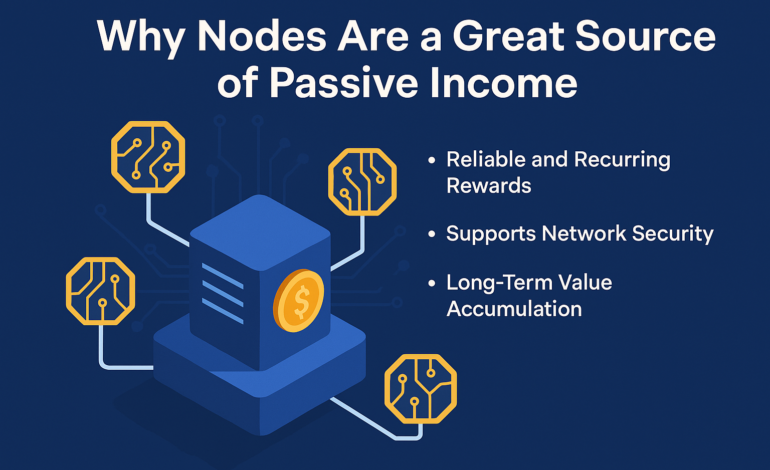In the ever-evolving world of blockchain technology, node-based rewards have emerged as a powerful incentive model. By running nodes, participants not only contribute to the decentralization and security of a network but also earn passive income. Whether you’re a blockchain enthusiast or a seasoned investor, understanding which blockchain networks offer the best node rewards can help you make smart and profitable decisions.

What Are Node-Based Rewards?
In a blockchain network, nodes are individual computers that validate transactions and maintain a copy of the ledger. To encourage more users to host nodes and help secure the network, many blockchains offer node rewards in the form of their native cryptocurrency.
These rewards vary based on the network’s architecture:
- Proof-of-Stake (PoS) or Delegated Proof-of-Stake (DPoS) often require staking tokens.
- Masternodes need a fixed amount of tokens to be locked.
- Validator nodes usually require higher uptime and technical setup.
Top Blockchain Networks Offering Node-Based Rewards
1. Ethereum 2.0 (ETH)
- Type: Proof-of-Stake
- Minimum Stake: 32 ETH
- Annual ROI: 4% to 7%
- How to Earn: Run a validator node on Ethereum 2.0 by staking 32 ETH. Rewards are earned for validating blocks and maintaining uptime.
Why It’s Popular: Ethereum is the largest smart contract platform, making ETH staking one of the most trusted and future-proof options.
2. Polkadot (DOT)
- Type: Nominated Proof-of-Stake
- Minimum Stake: Varies (~120 DOT for validators)
- Annual ROI: Up to 14%
- How to Earn: Become a validator or nominate a trusted validator. Rewards are distributed to both.
Unique Advantage: Offers high flexibility and rewards for nominators without running a full node.
3. Cosmos (ATOM)
- Type: Delegated Proof-of-Stake
- Minimum Stake: No minimum for delegators
- Annual ROI: 7% to 10%
- How to Earn: Delegate ATOM to a validator node or run your own validator node to earn staking rewards.
Why It’s Hot: Cosmos focuses on interoperability and has a growing ecosystem of app chains.
4. Dash (DASH)
- Type: Masternode
- Minimum Stake: 1,000 DASH
- Annual ROI: 5% to 7%
- How to Earn: Run a masternode and provide services such as InstantSend and PrivateSend to earn consistent rewards.
Key Benefit: Dash was one of the first to introduce masternodes, with a well-established community and documentation.
5. Chainlink (LINK)
- Type: Oracle Node
- Requirements: Technical expertise, security, and uptime
- Earnings: Based on data requests fulfilled
- How to Earn: Run a Chainlink node that provides off-chain data to smart contracts.
Best For: Developers or enterprises looking for customizable node-based income.
6. Flux (FLUX)
- Type: Decentralized Cloud Infrastructure Node
- Minimum Requirement: Varies by node tier (Cumulus, Nimbus, Stratus)
- Annual ROI: 10% to 25% (based on node type)
- How to Earn: Host applications and services on Flux’s decentralized cloud via running nodes.
Why It’s Different: Offers real-world use cases beyond blockchain, such as web hosting, DApps, and more.
7. StrongBlock (STRNGR) (Note: As of 2025, DYOR on latest updates)
- Type: Node-as-a-Service
- Node Requirement: STRNGR tokens to create nodes
- Rewards: Paid in STRNGR tokens
- How to Earn: Create and maintain a node using the StrongBlock platform.
Warning: This platform has seen changes and volatility; always check current status before investing.
Key Considerations Before Running a Node
Running a node for rewards sounds exciting, but it’s not for everyone. Keep these factors in mind:
- Initial Investment: Some nodes require significant capital.
- Technical Skills: Validator nodes and oracle nodes may need server management skills.
- Uptime & Security: Your node must be online and secure 24/7 to earn rewards.
- Volatility: Reward tokens can fluctuate in value.
Conclusion
Node-based rewards present a fantastic opportunity to earn passive income while supporting decentralized ecosystems. Whether you’re looking at Ethereum 2.0 for stability or Flux for innovation, there’s a blockchain network to suit every type of investor or developer.
Before diving in, make sure to research the latest requirements and reward structures, and always calculate potential ROI against risk.
FAQs
Q: Can I earn node rewards without technical knowledge?
Yes! Some networks like Cosmos and Polkadot allow you to delegate tokens instead of running your own node.
Q: Are node rewards taxable?
In most jurisdictions, yes. Node rewards are considered income. Check with a local tax advisor.
Q: What’s the safest way to start?
Delegating tokens to reputable validators is the safest way for beginners to start earning.



